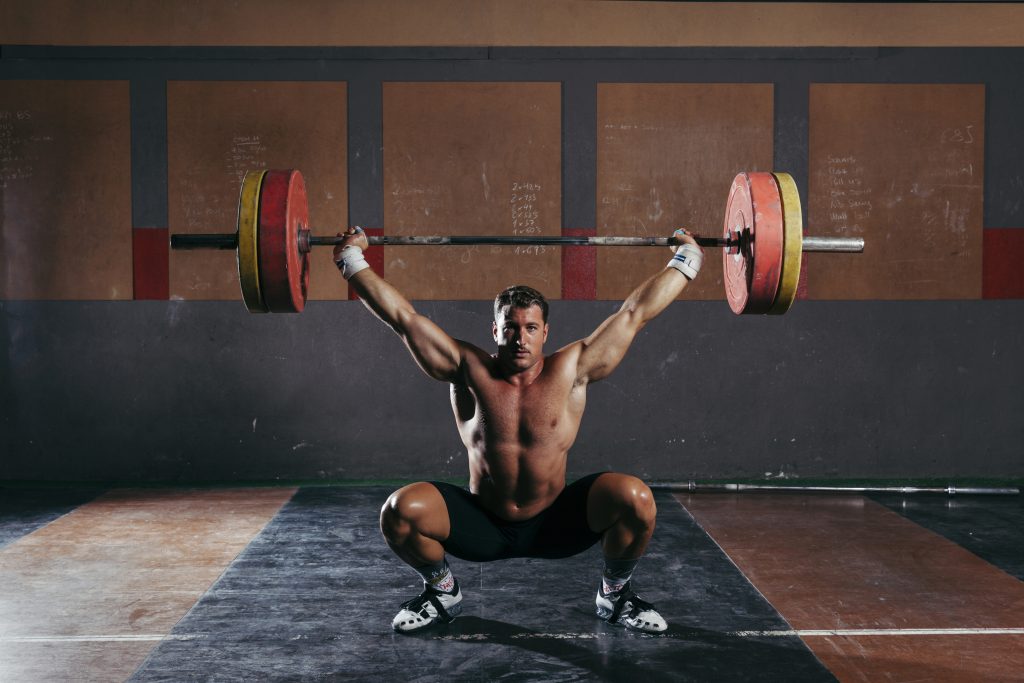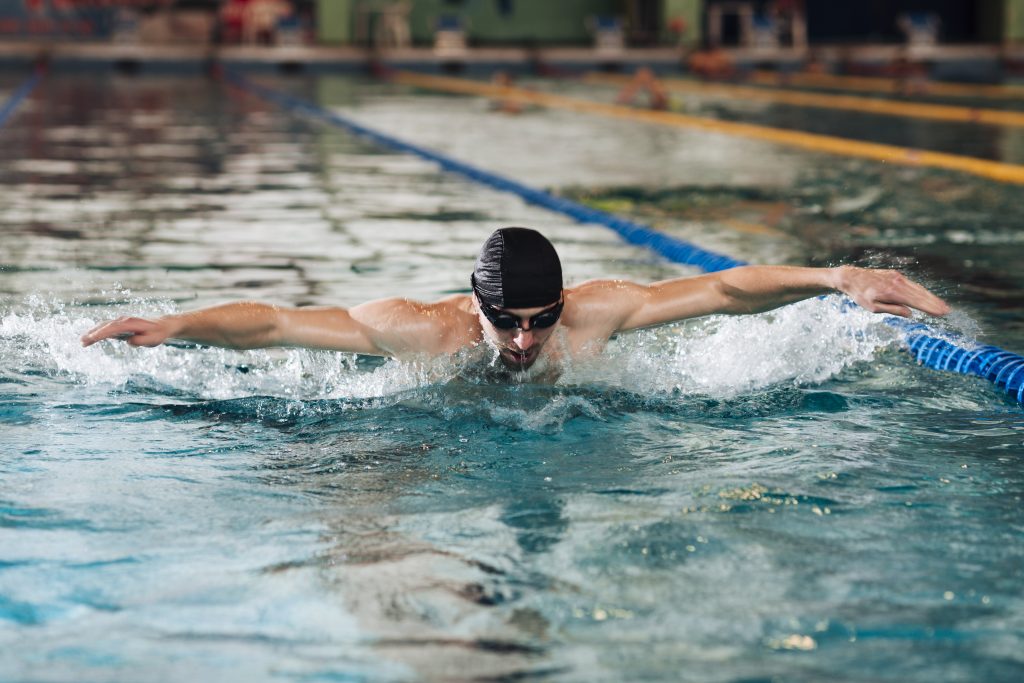Have you ever wondered what makes an athlete a professional weightlifter instead of a professional swimmer?
Sure, on a surface, it may be because their body types are naturally suited for specific sports. However, beyond that, engaging in different fields of sports also requires different muscle capabilities1.
In other words, while there are sports that require an athlete to possess more muscle strength than muscle endurance, there are also sports that use muscle power, or even a combination of strength and power!
Interesting, isn’t it?
Let’s have a look at muscle strength and power

Muscle strength is the ability of the muscle to exert the maximum force over a short amount of time, while muscle power is the interaction between the force and velocity of a muscle contraction1, which is particularly important in explosive type of sports. There are some sports that require a lot of muscle strength and power. For instance, weightlifting, sprinting and even jumping1.
But what about swimming, then? Swimmers, importantly need more muscle endurance since they use less force than strength-oriented sports and must sustain it over an amount of time2.
Do you see the difference now?

Genes could play a role in your muscle strength and power
First of all, muscle strength and power level is quite a complex trait since it is multifactorial3. In other words, nutrition1, exercise training and even genetics3 can influence one’s muscle strength and power. That is to say, genetically, people who have certain genes might possess a higher muscle strength and power in comparison to those who don’t, thus making them much more suited in strength/power-oriented sports rather than endurance-oriented sports.
Gene that is associated with muscle strength and power
The ACTN-3 gene is said to be associated with muscle strength and power. This gene instructs the body to produce a protein called alpha(α)-actinin-3 which simply is a protein that is only found in fast-type muscle fibres4. These fibres contract quickly but tire rapidly4, hence are desirable in sports like sprinting1,4 which requires strength and power.
Here comes the tricky part.
In a typical gene like ACTN-3, a person can either have both RR alleles, both XX alleles or RX alleles as shown below.

ACTN-3 gene with R allele gives a higher proportion of fast-type fibres than slow-type fibres1. A study by Yang et al. (2003) which has been replicated by other studies in recent6,7,8,9, found that:
1. There were more R allele found among elite sprinters compared to non-athletes.
and
2. There were more RX alleles found among female elite sprinters than elite endurance athletes.
This tells that having R allele is considered advantageous in strength/power sports1.
However, it is important to note that the studies reporting on the consistent association between this gene and muscle strength and power were found among athletes and not the general population to date10.
Genetic testing and your muscle strength and power
Although genetics may play a role in sports performance, not having this desirable gene doesn’t totally determine one’s ability to be a successful sprinter, weightlifter or other types of strength/power-oriented sports athlete11. As mentioned, muscle strength and power are multifactorial and genetic is one factor among many other predictors for a superior sports performance – besides having an optimal environment, nutrition and training1,4.
However, if you are wondering whether you are genetically prone to have high muscle strength and power, genetic testing may be your solution to answer your doubt.
Try out our DNA Explorer Essential today to discover your DNA!
References:
1. Guth, L. M., & Roth, S. M. (2013). Genetic influence on athletic performance. Current opinion in pediatrics, 25(6), 653–658. https://doi.org/10.1097/MOP.0b013e3283659087
2. Performance Spine and Sports Medicine (2016, October 7). What is difference between endurance, sport and power? https://www.performancepain.com/what-is-difference-between-endurance-strength-and-power/
3. Kostek, M., Hubal, M. J., & Pescatello, L. S. (2007). Genetic Roles in Muscle Strength. ACSM’s Health & Fitness Journal, 11(2), 18-23. doi:10.1249/01.FIT.0000262475.20949.bc
4. National Institute of Health (2020a, March 3). Is athletic performance determined by genetics? https://ghr.nlm.nih.gov/primer/traits/athleticperformance
5. Yang, N., MacArthur, D. G., Gulbin, J. P., Hahn, A. G., Beggs, A. H., Easteal, S., & North, K. (2003). ACTN3 genotype is associated with human elite athletic performance. Am J Hum Genet, 73(3), 627-631. doi:10.1086/377590
6. Kikuchi, N., Miyamoto-Mikami, E., Murakami, H., Nakamura, T., Min, S. K., Mizuno, M., . . . Fuku, N. (2016). ACTN3 R577X genotype and athletic performance in a large cohort of Japanese athletes. Eur J Sport Sci, 16(6), 694-701. doi:10.1080/17461391.2015.1071879
7. Papadimitriou, I. D., Lucia, A., Pitsiladis, Y. P., Pushkarev, V. P., Dyatlov, D. A., Orekhov, E. F., . . . Eynon, N. (2016). ACTN3 R577X and ACE I/D gene variants influence performance in elite sprinters: a multi-cohort study. BMC Genomics, 17, 285. doi:10.1186/s12864-016-2462-3
8. Weyerstrass, J., Stewart, K., Wesselius, A., & Zeegers, M. (2018). Nine genetic polymorphisms associated with power athlete status – A Meta-Analysis. J Sci Med Sport, 21(2), 213-220. doi:10.1016/j.jsams.2017.06.012
9. Yang, R., Shen, X., Wang, Y., Voisin, S., Cai, G., Fu, Y., . . . Yan, X. (2017). ACTN3 R577X Gene Variant Is Associated With Muscle-Related Phenotypes in Elite Chinese Sprint/Power Athletes. J Strength Cond Res, 31(4), 1107-1115. doi:10.1519/jsc.0000000000001558
10. Eynon, N., Hanson, E., Lucia, A., Houweling, P., Garton, F., North, K., & Bishop, D. J. (2013). Genes for Elite Power and Sprint Performance: ACTN3 Leads the Way. Sports medicine (Auckland, N.Z.), 43. doi:10.1007/s40279-013-0059-4
11. National Institute of Health (2020b, January 13). Direct-to-consumer genomic testing. https://www.genome.gov/dna-day/15-ways/direct-to-consumer-genomic-testing
